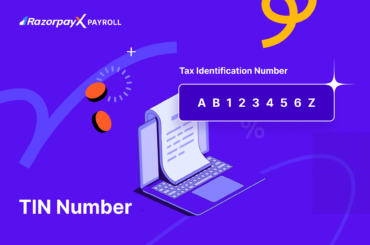Table of Contents
HR Executive Job Description
HR executive job description includes managing recruitment, employee engagement, and compliance while shaping its organizational culture.
HR executives play a crucial role in creating a productive workplace, from managing payroll and performance management to onboarding new employees. Additionally, they are critical for keeping employee satisfaction high and revising HR policy.
It can be difficult to manage multiple duties, but software like RazorpayX Payroll makes tasks like payroll distribution and compliance monitoring easier.
RazorpayX Payroll ensures smooth HR operations by automating tedious procedures, freeing up HR experts to concentrate on strategic objectives and employee well-being.
HR Executive Job Description Sample
HR Executive
Department: Human Resources
Job Summary
We are looking for an experienced HR Executive to join our team and support various human resource functions at [Your Company Name].
In this role, you will manage key tasks such as recruitment, onboarding, employee relations, and ensuring compliance with HR policies and labour regulations.
Your primary focus will be on creating effective HR strategies that promote a positive workplace environment and improve employee engagement.
Responsibilities
- Look after recruitment processes, including sourcing candidates, conducting interviews, and onboarding new hires.
- Develop and implement HR policies, procedures, and strategies to ensure smooth daily operations.
- Maintain employee records, compensation, and benefits information, ensuring accuracy and compliance.
- Handle employee relations, resolve conflicts, and address problems to promote a healthy work environment.
- Stay updated on employment laws and regulations, ensuring the company remains compliant.
- Design and run training and development programs to support employee growth and organizational development.
- Manage payroll and employee benefits programs, for smoother processing and compliance.
Requirements
- 2+ years of experience in HR management or related fields, such as recruiting or training.
- Familiarity with HR software, labour laws, and compliance standards.
- Strong communication and problem-solving skills.
- A degree in Human Resources or a related field.
If you think you are the right fit for this role, send us your resume at abc@gmail.com
Skills Required for the HR Executive Role
To make the HR Executive job description effective and attract top talent, some key skills to include in the JD include:
- A strong understanding of HR principles, practices, and processes is critical, along with knowledge of employment laws, regulations, and the industry’s best practices to maintain organizational compliance.
- Recruitment and selection are central to any HR role. This requires proficiency in sourcing, screening, interviewing, and onboarding candidates. Knowledge of Applicant Tracking Systems (ATS) is also necessary to streamline the hiring process and manage candidate data efficiently.
- Strong employee relations skills are vital, including the ability to handle grievances, conflicts, and concerns fairly. HR Executives must have excellent communication and mediation skills to foster a positive workplace culture and resolve conflicts effectively.
- Experience in HR policies and compliance is important for developing and updating policies, and employee handbooks, and ensuring adherence to compliance requirements using tools like compliance management software.
- Performance management skills are essential for setting goals, conducting appraisals, and implementing performance improvement plans. Proficiency in performance management software helps track and analyze performance data.
- Training and development expertise is necessary to assess training needs, coordinate learning programs, and utilize Learning Management Systems (LMS) for effective program administration.
- HR analytics skills are important for gathering, analyzing, and interpreting data to support decision-making. Familiarity with HR analytics tools is crucial for data visualization and reporting.
- Strong communication skills, both verbal and written, are essential for collaborating with cross-functional teams. Interpersonal skills, including empathy, negotiation, and conflict resolution, are also critical for building relationships and fostering a healthy workplace.
- Organizational skills are key to managing multiple responsibilities, prioritizing tasks, and managing smooth HR operations.
Roles and Responsibilities of an HR Executive
Some important roles and responsibilities to include in the HR executive job description include:
Human Resource Planning
An HR Executive helps with developing strategic plans to ensure the organization’s growth and resource allocation. They assess team performance against organizational goals, ensuring course corrections based on outcomes. By proactively planning for talent acquisition, HR ensures the company has the right people in place to meet objectives and deadlines.
Job Analysis
HR executives are responsible for conducting job analyses to identify the most suitable candidates for open roles. These analyses include studying job descriptions and facilitating internal transfers to optimize talent and reduce recruitment costs. By aligning individuals with roles that best fit their strengths, HR ensures high-performing teams are maintained.
Maintaining Work Culture
Creating a positive work culture is a key responsibility of HR. They make sure employees feel secure and supported, improving their productivity and performance. By maintaining a transparent culture where employees can discuss issues freely, HR contributes to a positive environment.
Initiatives such as team events, sports, or entertainment further enhance employee engagement and boost morale.
Processing Payroll
Payroll processing is a critical HR function. They ensure the timely and accurate payment of salaries, bonuses, and other benefits based on attendance, performance, and leave policies. By maintaining employee compensation records, HR helps ensure compliance with payroll regulations and promotes fair treatment across the organization.
Labor Law Compliance
HR is also responsible for ensuring that company policies align with relevant labour laws and regulations. They review and update policies annually to address legal concerns and enhance operational efficiency. By staying up-to-date with compliance, HR helps mitigate risks and reduce conflicts, ensuring the organization remains legally compliant.
Staying compliant with labour laws can sometimes feel like a challenge but with RazorpayX Payroll, you can ensure the smooth handling of PF, ESI, TDS, and more, all in one place, making compliance easier!
To Conclude
The role of an HR Executive is important in driving an organization’s success by managing key HR functions such as recruitment, employee relations, compliance, and performance management.
The responsibilities, skills, and qualifications outlined in this article provide a comprehensive guide for companies seeking to hire the right talent.
Whether you’re a small business or a large enterprise, understanding the HR Executive job description can help you attract candidates who align with your organizational goals.
Make use of this information to tailor your job postings and identify professionals who can help create a compliant and productive work environment.
FAQs
Q. Is the role of HR Executive similar across industries?
The core responsibilities of HR Executives include recruitment, employee relations, and compliance. They remain consistent across industries.
However, certain roles may vary depending on industry-specific needs, such as labour laws or specialized skills required in certain sectors like tech or healthcare.
Q. What qualifications to include in HR Executive Job Description?
Typically, HR Executives hold a bachelor’s degree in HR, Business, or a related field. Certifications like SHRM or HRM further show professional development and expertise in HR management.
Q. What are the main functions of an HR Executive?
HR Executives are responsible for workplace safety, talent management, training, compensation, and benefits, and ensuring compliance with labour laws.
Q. How to find the right candidate for HR Executive?
To find the right candidate, look for individuals with a relevant educational background, certifications, and strong HR skills. Experience in recruitment, compliance, and employee relations is key, along with the ability to adapt to industry-specific needs.
Q. What is the role of a junior HR Executive?
A Junior HR Executive supports the recruitment, onboarding, and HR operations. They assist in administrative tasks like maintaining employee records and ensuring smooth documentation processes.





